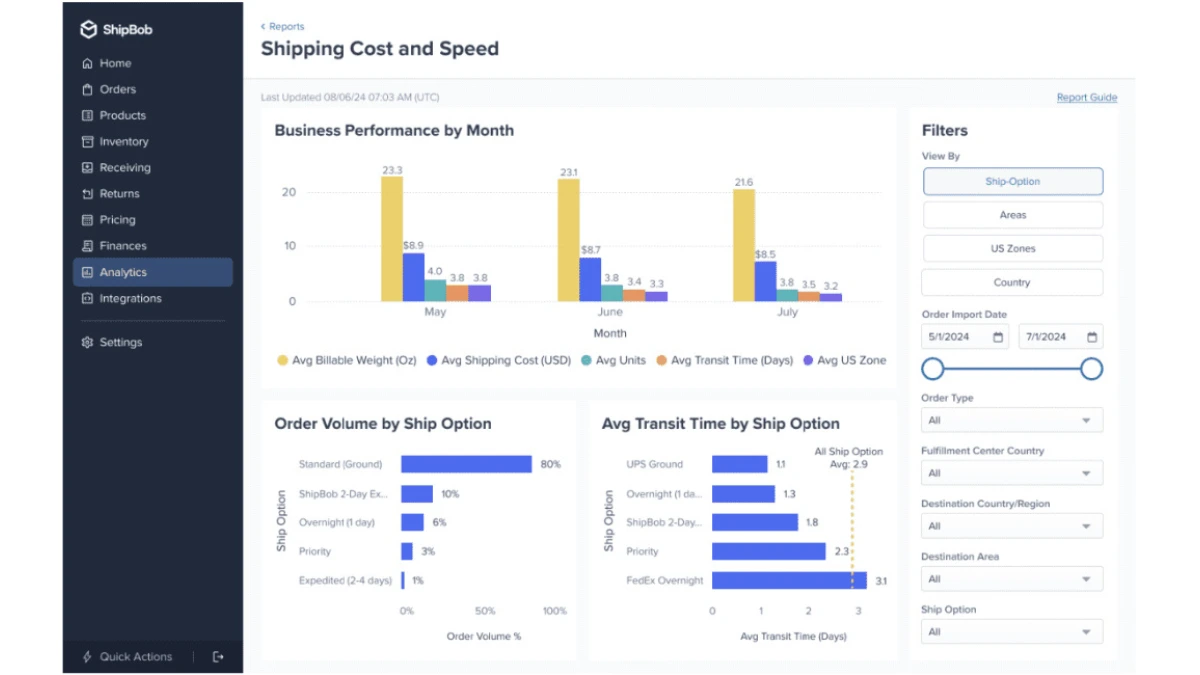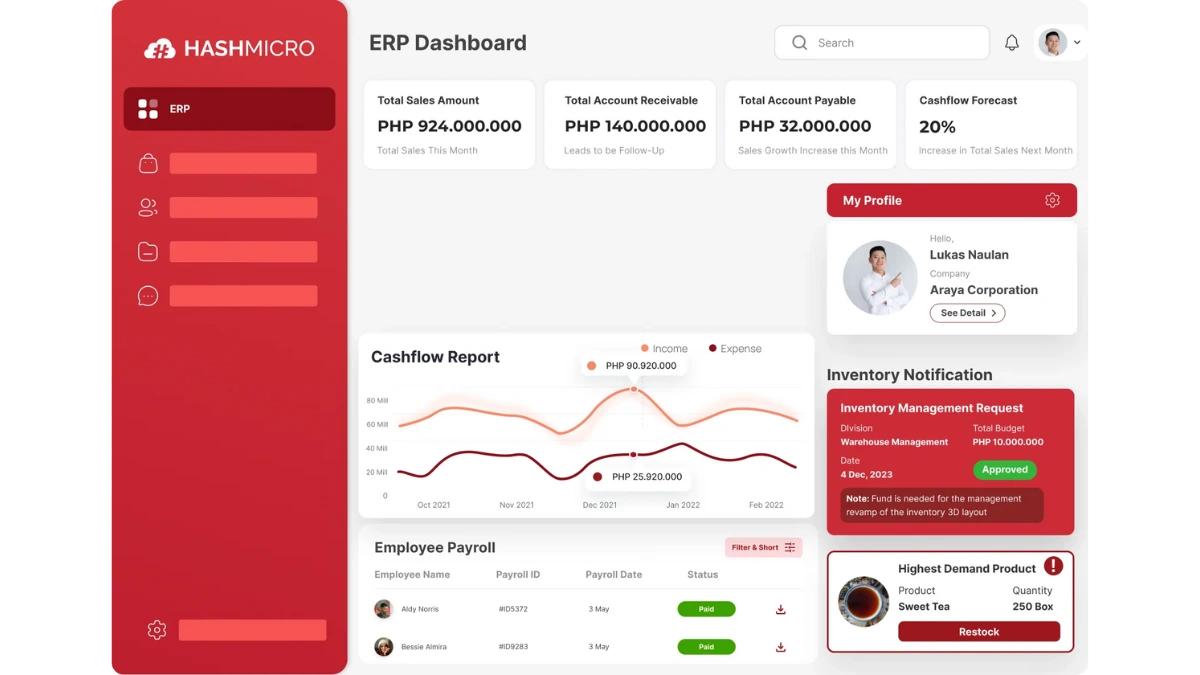Running an e-commerce business today comes with higher stakes. Customers expect fast delivery, real-time updates, and flawless service. Even one late shipment can impact your reputation and bottom line.
Without the right tools, managing inventory, shipping, and warehousing quickly becomes overwhelming. Relying on manual systems often leads to delays, errors, and missed growth opportunities.
According to the Asian Development Bank, logistics inefficiencies cost SMEs up to 20% of their annual revenue in the Philippines. That’s a significant loss that could be avoided with better systems.
This article explores practical software solutions that can help streamline your operations. One standout is HashMicro—an all-in-one ERP platform built to automate growing businesses’ inventory, logistics, and supply chain workflows.
Table of Contents

Key Takeaways
|
What is ShipBob?
ShipBob is a global omni-fulfillment platform designed to help e-commerce businesses streamline their order fulfillment processes. With over 60 strategically located fulfilment centres across the US, Canada, UK, EU, and Australia, ShipBob empowers brands to reach customers faster and more efficiently.
The platform is built to handle everything from inventory management to shipping and returns, offering end-to-end logistics support. By integrating seamlessly with major e-commerce platforms, ShipBob enables real-time order tracking, automated workflows, and centralized control over multi-channel fulfilment.
Trusted by e-commerce brands, ShipBob is more than just a 3PL provider—it’s a growth partner. Whether scaling to new markets or optimizing delivery speeds, ShipBob offers the tools and infrastructure to elevate your customer experience and operational efficiency.
How Reliable is ShipBob for Your Order Fulfilment Needs?
ShipBob has built a strong reputation as a reliable fulfillment partner for e-commerce businesses of all sizes. Its global network of 60+ fulfillment centers and technology-driven platform ensures timely deliveries, accurate inventory tracking, and seamless integration with major e-commerce platforms.
The company’s operational infrastructure is designed to handle high volumes efficiently, making it a trusted choice for fast-growing brands. With real-time analytics and automated workflows, merchants can monitor performance and quickly adapt to changing customer demands.
While ShipBob reviews offers consistent service quality, its fast-paced environment can sometimes challenge internal teams. However, the company invests in continuous improvement, innovation, and support, demonstrating a strong commitment to reliability and client satisfaction in the long term.
Key Features of ShipBob
To effectively manage e-commerce logistics, businesses need reliable tools like e-commerce inventory management software that simplify inventory and order fulfillment processes. Below are key features offered by ShipBob that help streamline operations and improve overall efficiency.
- Inventory distribution: ShipBob allows businesses to store products in multiple fulfilment centres, helping reduce customer delivery times. This setup supports better inventory allocation and regional demand management.
- Order fulfilment services: The platform handles the whole order process, picking, packing, shipping, and returns, through its network of fulfilment centres. It helps businesses streamline logistics without building their infrastructure.
- Two-day shipping capability: Businesses can offer two-day shipping in selected regions by utilising ShipBob’s distributed warehouse network. Depending on inventory placement and carrier efficiency, this can enhance delivery speed.
- Customisable packaging options: ShipBob supports branded packaging elements like custom boxes or inserts, helping businesses deliver a consistent brand experience to their customers.
- Real-time warehouse management: The platform provides real-time visibility into stock levels and warehouse operations across locations. Alerts and dashboards help prevent stock issues and support efficient inventory planning.

Pros and Cons of ShipBob
When choosing a fulfillment partner, it’s crucial to weigh the advantages and potential drawbacks to find the best fit for your business needs. Below, we explore the key pros and cons of ShipBob reviews to help you decide whether this platform aligns with your e-commerce goals.
Pros of ShipBob
According to website reviewer SpeedCommerce, ShipBob reviews offer several notable advantages, making it a popular choice among e-commerce businesses. Below are some key benefits highlighted by their review, which showcase why many brands trust ShipBob for their fulfillment needs.
- Scalable fulfillment network: ShipBob offers a flexible fulfillment solution that supports businesses as they grow, accommodating increasing order volumes without disruption. Their network of fulfillment centres across key regions helps brands expand their reach efficiently.
- Seamless integration and real-time tracking: The platform integrates smoothly with popular e-commerce channels, syncing orders and inventory automatically to reduce errors. Real-time tracking of inventory and shipments provides businesses with up-to-date visibility for better decision-making.
- Automated and efficient order processing: ShipBob automates critical fulfillment steps such as order routing, packing, and shipping, which minimizes mistakes and speeds up delivery times. These streamlined workflows help businesses maintain consistency and improve customer satisfaction.
- Returns and packaging customization: The system simplifies returns management, making it easier for businesses to handle exchanges and refunds effectively. Additionally, ShipBob offers customizable packaging options to help brands deliver a memorable unboxing experience.
- Transparent pricing and customer support: ShipBob provides clear and straightforward pricing plans, allowing businesses to forecast fulfillment costs accurately. This transparency and dedicated customer support ensure smoother operations and assistance when needed.
Cons of ShipBob
Business.org highlights some critical limitations of ShipBob that potential users should consider before committing. Below are key drawbacks noted in their review that may impact whether ShipBob fits your business.
- Basic inventory management features: Although ShipBob provides fundamental inventory tracking for order fulfillment, it does not include advanced functionalities for handling supplier relationships, purchase orders, or inbound inventory management. Companies seeking a more comprehensive cloud inventory management software might need to integrate additional tools.
- Fulfillment challenges with large or bulk orders: Some users report that ShipBob occasionally struggles to process and fulfill large orders efficiently. This could be a factor for e-commerce brands whose customers frequently place sizable orders.
- Customer service response times: Several customers note delays and challenges in customer service response, especially when resolving fulfillment errors or billing questions. Timely support can vary depending on issue complexity and location.
- Hidden fees and shipping costs: Though ShipBob aims to offer competitive shipping rates, some users experience unexpected or higher-than-expected charges, particularly for warehouse storage and short-distance shipping. The lack of upfront transparency on these fees can complicate budgeting.
ShipBob’s Edge in the 3PL Competition
ShipBob’s 3PL platform integrates a proprietary warehouse management system and advanced order fulfillment software that streamlines the entire fulfillment process, from order routing to packing, shipping, and tracking. This technology routes orders to the nearest fulfillment center, helping reduce transit times and improve delivery accuracy.
The platform offers robust inventory and order management features, including reorder notifications, product bundling, and flexible order adjustments post-purchase. Additionally, its B2B fulfillment capabilities support retail dropshipping and wholesale shipping, enabling merchants to operate across diverse sales channels.
ShipBob’s dashboard provides real-time insights into fulfillment metrics, shipping performance, and inventory status, empowering businesses with transparent reporting and data-driven decision-making. While many 3PL providers rely on third-party software, ShipBob’s ownership of its technology stack allows for greater control and responsiveness to customer needs, supporting scalable e-commerce growth.
ShipBob Pricing Plans
Rather than fixed pricing, ShipBob uses a tailored quote system to match each business’s specific needs. This personalized approach helps avoid paying for unnecessary features, though it can make side-by-side pricing comparisons a bit tricky. Many ShipBob reviews note this as a common consideration for potential users.
Below are the estimated pricing details from SimplFulfillment:
1. Onboarding and implementation fees
ShipBob offers a free onboarding option called the Growth Plan for businesses processing fewer than 400 monthly orders. This plan is self-service with no dedicated support. Premium Onboarding is available for fees up to $2,500 for those requiring additional assistance. It covers integration, training, and initial inventory setup and typically takes 1-2 weeks, sometimes longer.
2. Monthly storage and inventory fees
Storage fees are charged based on the type and amount of warehouse space used, not by SKU count. US rates start at $40 per pallet, $10 per shelf, $7.50 per small shelf, and $5 per bin. International rates vary by region, and additional costs include inbound receiving at $35/hour for the first two hours and $45/hour thereafter, plus a $3 fee per return processed.
3. Order handling and fulfillment fees
Fulfillment fees cover picking, packing, and preparing orders, with B2C rates in the US at $0.25 per unit and B2B fees at $0.40 per unit, $0.80 per case, and $10 per pallet. Standard packaging is included, while custom packaging and kitting services incur additional charges; however, average processing times are not publicly disclosed.
4. Shipping and delivery rates
ShipBob negotiates discounted rates with major carriers like UPS, USPS, FedEx, and DHL, but shipping costs vary depending on package size, weight, destination, and service level selected. Recent industry-wide carrier rate increases of 5-7% may affect current shipping prices, and exact rates are provided during the quote process.
5. Returns management and minimum spend
Return processing fees are generally around $3 per return across regions, with waived fees for Return to Sender orders, though return shipping costs still apply. Additionally, ShipBob requires a minimum monthly spend of $275 for fulfillment services, which can be a consideration for smaller or lower-volume businesses.
This pricing structure offers flexibility and scalability, making it suitable for businesses ready to grow, but may require careful budgeting for startups or low-volume sellers. Prospective users should request a personalized quote to understand the full scope of costs based on their unique order volumes and service needs.
Discover Why HashMicro May Be the Best Choice Compared to ShipBob
HashMicro delivers comprehensive supply chain and inventory management solutions to streamline business fulfilment operations across Southeast Asia. With a centralized ERP system, HashMicro empowers companies to automate warehouse tasks, manage multi-location inventory, and track real-time shipments.
You can explore HashMicro’s ERP through a free demo and experience how it transforms fulfillment operations while offering a level of control often missing in third-party logistics solutions. Backed by strong local support, HashMicro could be the all-in-one system your business needs to gain a competitive edge.
As a trusted ERP provider in the Philippines, HashMicro supports thousands of companies with a customizable platform tailored to various industries, including retail, distribution, and manufacturing. Whether managing high-volume orders, handling returns, or coordinating last-mile delivery, HashMicro offers businesses the flexibility and scalability to grow sustainably.
Below are some of the key features that make HashMicro a compelling alternative to ShipBob:
- Inventory Control: Real-time inventory tracking across multiple warehouses helps prevent stockouts, overstocking, and data discrepancies.
- Order Management: Automate the entire order cycle, from sales order creation to shipping status updates, to reduce manual errors and delivery delays.
- Warehouse Management: Utilize barcode scanning, batch tracking, and innovative location management to boost warehouse efficiency and picking accuracy.
- Procurement Automation: Streamline purchase requisitions, approvals, and supplier management with automated workflows and cost control.
- Financial Synchronisation: Integrated accounting tools help monitor expenses, invoice customers, and reconcile payments directly from the system.
- Custom Reporting: Generate actionable insights with customisable dashboards and reports for demand forecasting, stock valuation, and order performance.
With HashMicro’s ERP system, teams can effortlessly monitor stock levels, optimize reorder points, and sync data across departments. It also seamlessly integrates with accounting, CRM, and procurement modules, offering an end-to-end digital backbone for smarter business operations.
Conclusion
Businesses in the Philippines need a dependable logistics and fulfillment solution to meet rising customer expectations, ensure timely deliveries, and maintain operational efficiency. In today’s competitive e-commerce landscape, choosing the right system, based on trusted ShipBob reviews, is essential for scaling successfully and avoiding costly fulfillment delays.
HashMicro’s ERP Solution stands out as a powerful alternative to ShipBob. It offers advanced automation, real-time inventory tracking, and integrated logistics management—all in one centralized platform. It’s built to help businesses gain complete control, reduce operational costs, and improve customer satisfaction.
Naiintriga ka ba kung paano ito gumagana? Try our free demo and see how HashMicro can elevate your fulfillment process, simplify inventory management, and give your business a more competitive edge.























